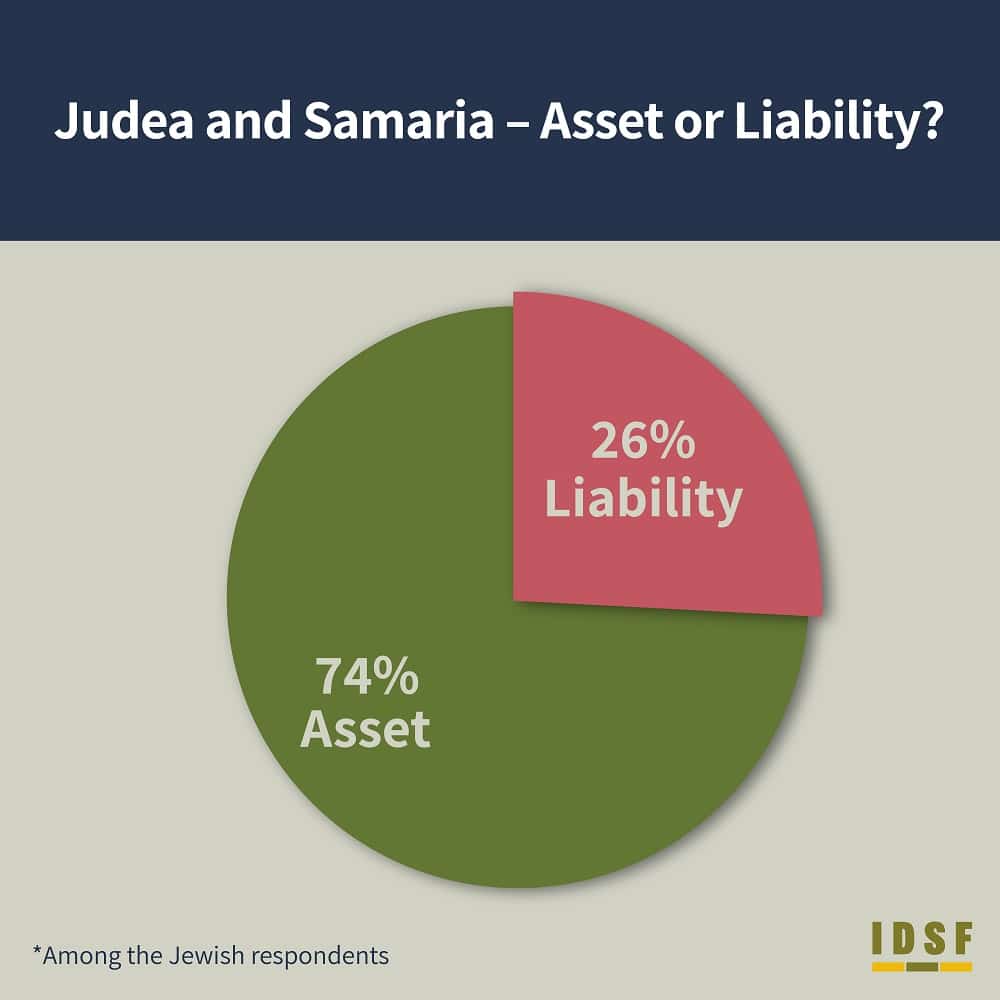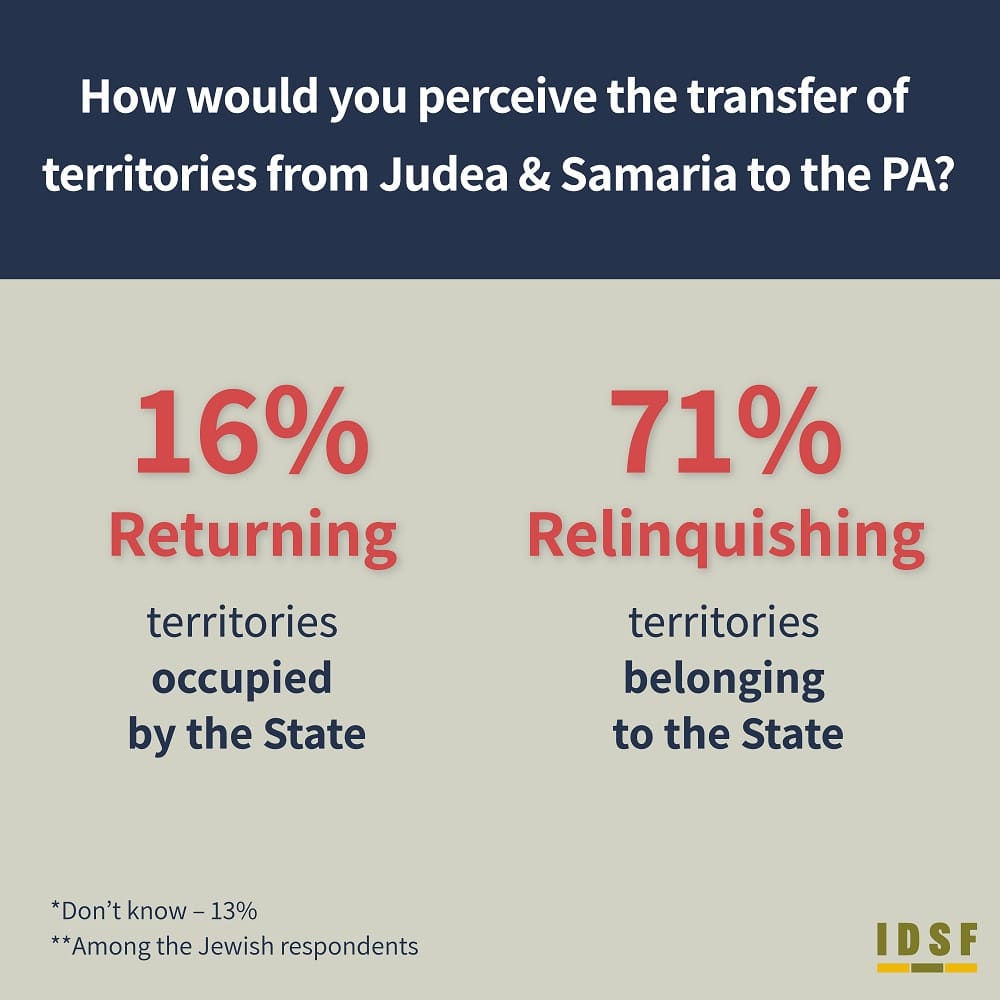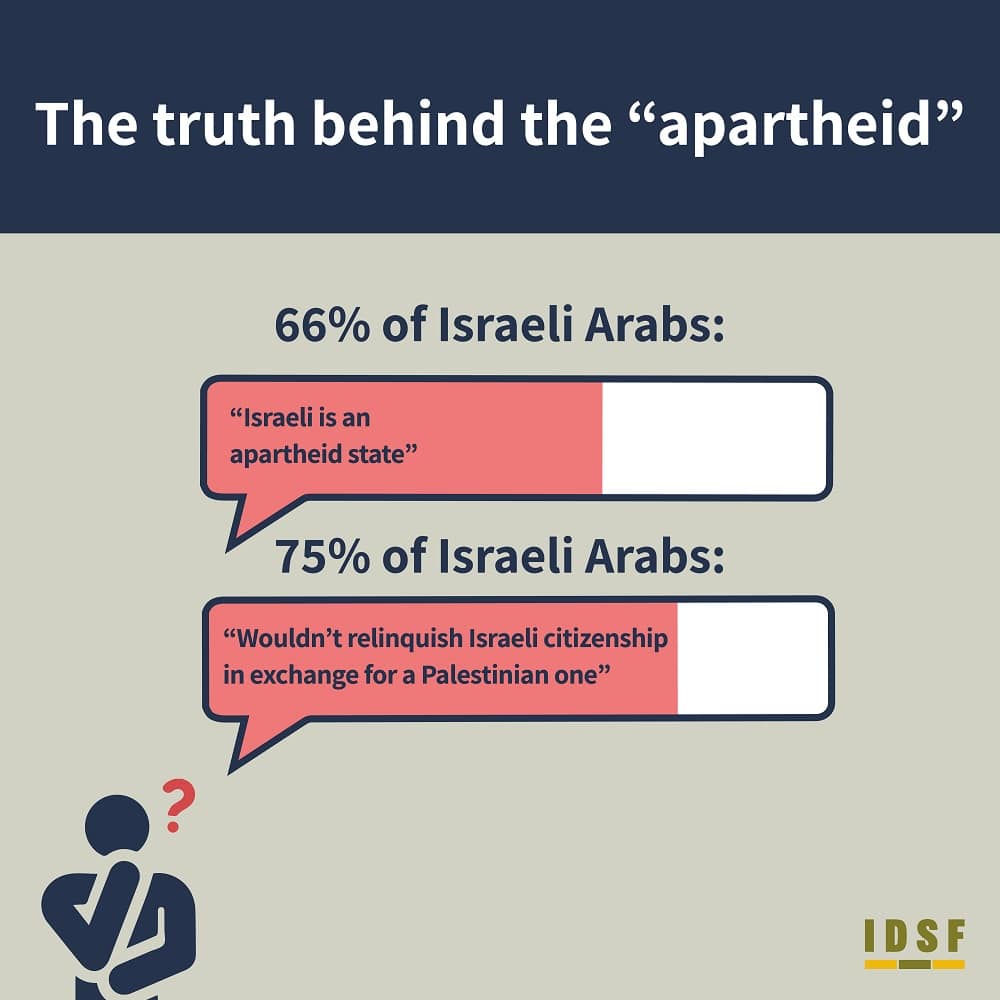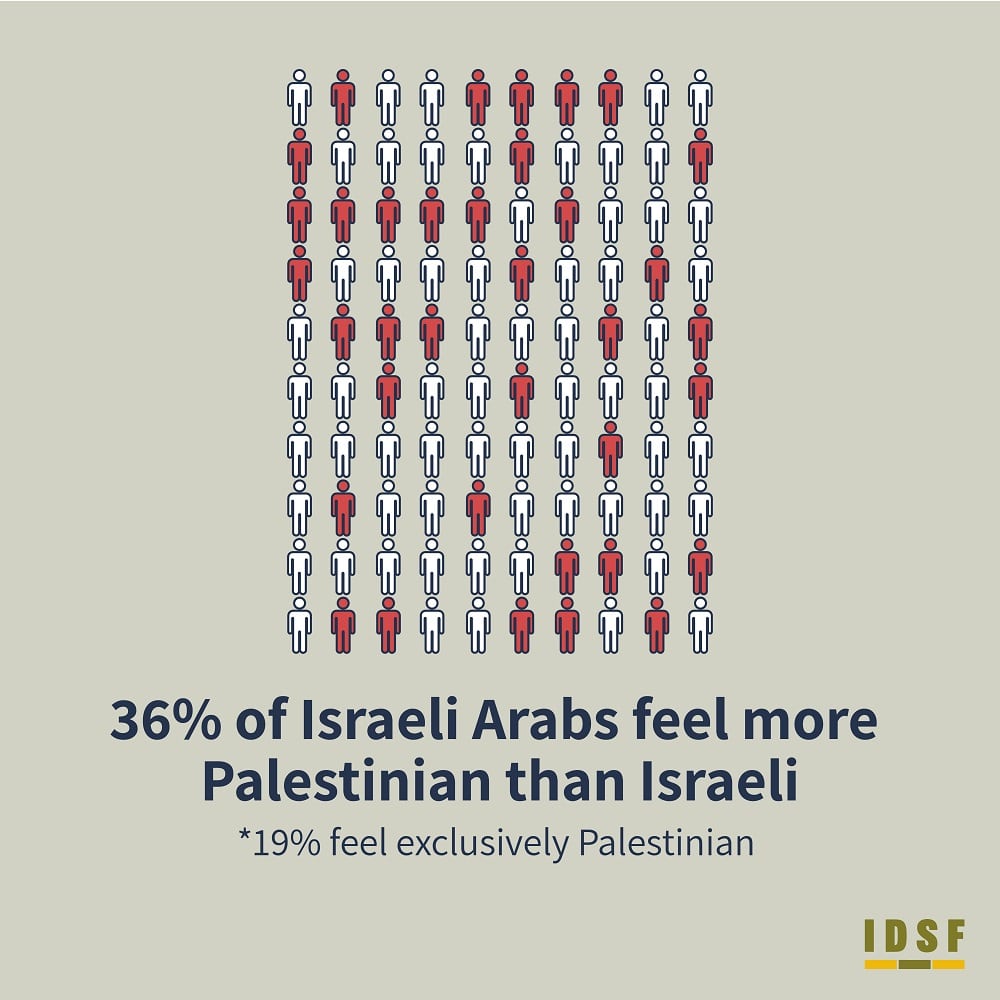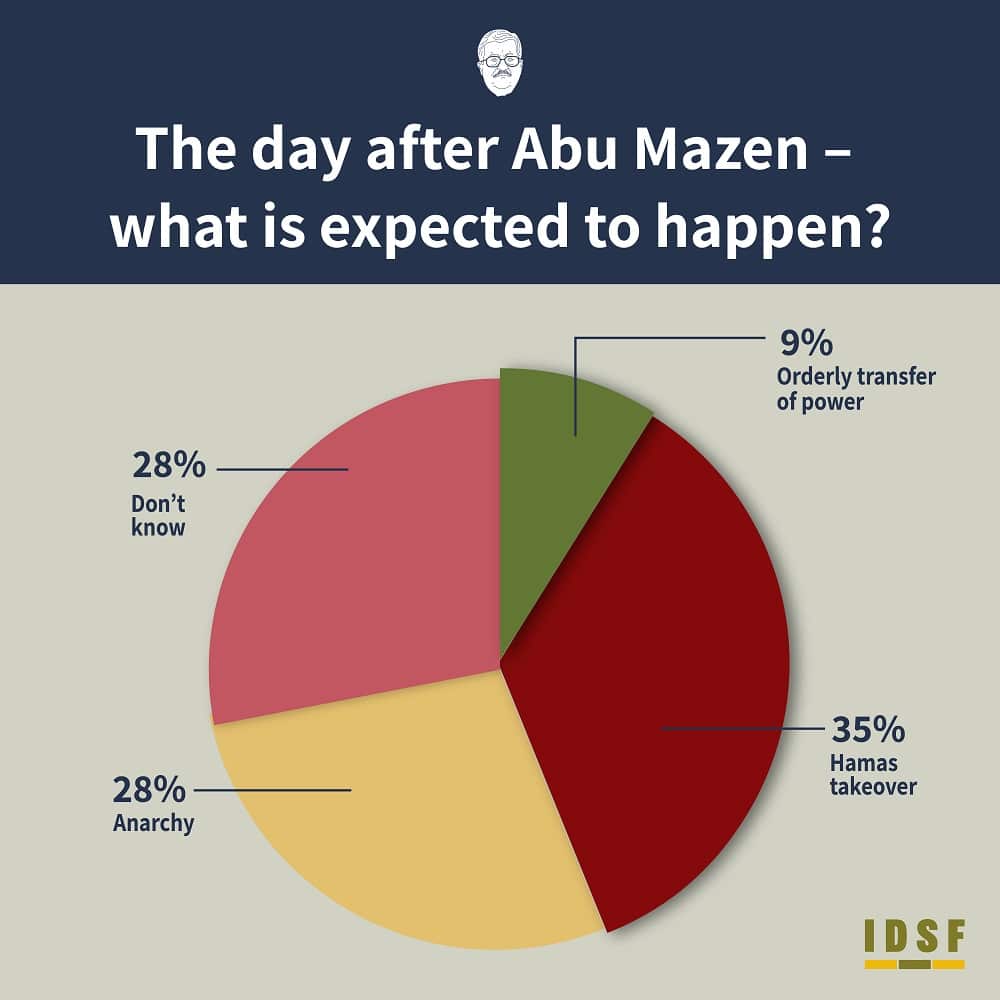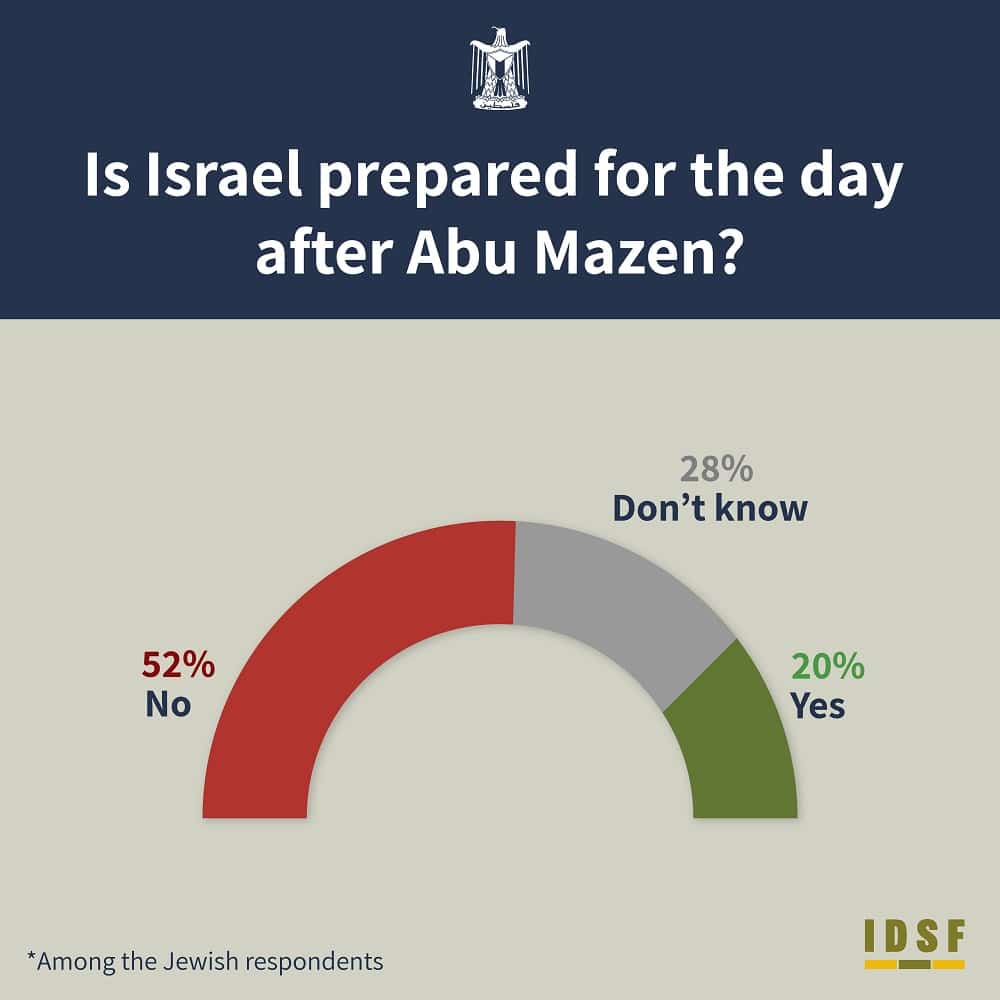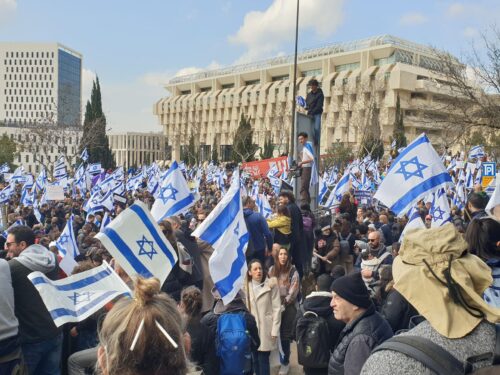The present IDSF index attempts to determine the status of Judea and Samaria in the eyes of the Israeli public, within a broader context. The results of the survey are presented in two separate parts: the first part reviews the existing perceptions and sentiments in the Israeli public towards Judea and Samaria – not necessarily through the prism of explicit security considerations. The second part, presented to you here, analyses the findings on the public’s perceptions of the political and security considerations regarding Judea and Samaria.
The survey was conducted by the IDSF research department and with statistical guidance from Dr. Hagai Elkayam. The sample was conducted among 1,191 respondents from the adult population (18+) in Israel who use the Internet. For the Jewish sample (956 respondents), the maximum margin of error is ±3.17% with a probability of 95%; For the combined sample (1,191 respondents), the maximum margin of sampling error is ±2.84% with a 95% probability; For the Arab sample (235 respondents), the maximum margin of error is ±6.39% with a probability of 95%.
A National Asset: The Righteousness of the Path of the People of Zion
We started the survey with an exploration of the emotional-perceptional views of the Israeli public regarding Judea and Samaria. We first set out to examine through varied types of questions, whether the Israeli public perceives Judea and Samaria as an area that contributes to or compromises the security of the State of Israel.
The responses show that 71% of the Jewish public in Israel think that whomever controls Judea and Samaria invariably holds the strategic-security advantage over Israel’s coastal plain as well. In other words, the perception according to which Israel’s control over Judea and Samaria is crucial for maintaining normal life in the Dan metropolis is dominant in Israel’s public. As to the question whether the control over Judea and Samaria compromises Israel’s safety and security – only 22% of the Jewish public thought so.
The following questions were in the same vein: a polar question – “do you view Judea and Samaria as an asset or a liability?” – shows that the majority of Israel’s public (61%) believes that the Judea and Samaria region is an asset, as oppose to only 39%, who believe the region is a liability. In a segmentation of the answers according to nationality, the disparity between Jews and Arabs is evident: a clear majority of the Jewish public perceives Judea and Samaria as an asset, as compared with 26% of that group, who view the region as a liability. As oppose to them – 87% of the Israeli Arabs think that Judea and Samaria are a liability, while only 13% view the region as an asset to the State of Israel.
A segmentation by ideology of the Jewish participants’ responses, shows that an overwhelming majority (98%) of the respondents affiliated with the political right perceive Judea and Samaria as an asset, as compared with 47% of the respondents from the political center and only 12% of those affiliated with the left. Interestingly, a segmentation by gender shows that 82% of the Jewish female respondents thought that Judea and Samaria are an asset to the State, as compared with a lower rate of 65% among the Jewish male respondents. A possible explanation could be the military service in the region, which might be perceived as a personal liability on part of the Jewish male participants.
Terminology of Transfer: Relinquishing or Returning?
With the understanding that broad swaths of the Israeli public perceive Judea and Samaria as an asset to the State of Israel, we sought to examine whether this affects the public’s perception that these areas belong to the people of Israel. The answer is yes.
We asked the Jewish public if it would perceive a peace agreement that entails the transfer of Judea and Samaria to the Palestinian Authority – either as (a) the relinquishing of territories that rightfully belong to Israel or (b) the returning of territories Israel had occupied. The data shows that 71% of the Jewish public thinks that the transfer of the territory to the Palestinian Authority as part of a peace agreement constitutes the relinquishing of land that rightfully belongs to Israel (agreed by 6% of the Arab public).
A segmentation according to ideology shows marked differences between political left and right among the respondents: 95% of the respondents affiliated with the political right thought that transferring territories in Judea and Samaria to the PA would be relinquishing territories rightfully belonging to Israel, whereas less than 1% thought this would constitute a return of territories occupied by Israel to their rightful owners (4% responded that they didn’t know). In contrast, 13% of the left thought that the return of those territories to the PA would be relinquishing territories rightfully belonging to Israel, whereas 64% maintained that the transfer of Judea and Samaria to the PA constitutes the return of occupied territories to their rightful owners, and no less than 23% responded that they did not know – nearly six times the number of right-wing respondents who chose that option.
The data shows the Judea and Samaria are perceived by most of the Jewish public in Israel as territories that rightfully belong to Israel, and are assets for the country – particularly strategic-security assets. In other words: the foundation for the righteousness of the Jewish State’s path is deeply engrained in the Israeli public’s mind, albeit different in those affiliated with the political right and center, as compared with the left.
Who Is Discriminated Against? Depends on Who You Ask
It did not escape our attention that while large portions of the public view Judea and Samaria as an asset – there are others in society who think the region is in fact a liability for the State – namely a moral one. In this context, a prevalent argument often voiced in the debate on the Israel-Palestinian issue is that Israel’s control over Judea and Samaria creates in effect a state of oppression and discrimination, fosters terrorism and is even evocative of Apartheid regimes. One of the more complex issues occasionally discussed in the media is the illegal construction in Judea and Samaria. We explored public opinion on the matter asking the participants whether they feel there is selective enforcement against illegal building in the region, and if so – which group of the region’s population is more discriminated against.
Some 82% of the Israeli public thought that there indeed is selective enforcement against illegal construction in Judea and Samaria. However, 54% thought that the Jewish population is discriminated against while 28% thought the Arab population suffers more discrimination, (4% did not think selective enforcement exists at all in the region while 14% said they did not know).
Ideological affiliation was found to sway opinions on the matter – 90% of the respondents affiliated with the political right thought that the region’s Jewish population suffers more discrimination, while only 9% of the left leaning respondents agreed with this statement. In contrast, only 2% of the right thought that it is the Arab population that suffers most discrimination, while 71% of the left agreed with this statement.
A segmentation according to nationality shows that 62% of Israeli Arabs believe that the Arab population in the region is the target of discrimination, while 9% of those respondents thought that discrimination targets mostly the Jewish population. Of the Jewish respondents, 19% thought that the Arab population is discriminated against while 65% thought that discriminative enforcement against illegal building was aimed predominantly at the Jewish population in Judea and Samaria.
The findings indicate that the perception of discrimination is subjective. Determining which population gets the short end of the discrimination stick is tricky, if at all possible. Each side feels it is discriminated against on part of the law enforcement authorities. Moreover, for each study that shows discrimination against the Arab population in Judea and Samaria – there are studies that claim the contrary – that often the Arab population enjoys leniencies that their Jewish counterparts in the region do not receive.
We further examined the issue of enforcement discrimination in Judea and Samaria, and asked the public if it thought that the Israeli administration in the region creates laws that benefit the Jewish population more than the Arab citizens (a state of affairs that is the basis for allegations of an apartheid regime in the region). Of the Jewish respondents, 29% thought this was true, as oppose to 79% of the Israeli Arabs. We further posed the direct question: “Is Israel, in general, an apartheid state?”. 12% of the Jewish respondents replied “yes”, and 66% of the Israeli Arabs also thought Israel is an apartheid regime.
This indicated that at least in the Jewish public there is a majority that does not maintain that there is selective enforcement against the Arab population in Judea and Samaria, and that the State of Israel is not an apartheid regime. In the Arab public, in contrast, the perception of Israel as an apartheid regime is strong. We explored this perception from another angle.
Is Zionist “Apartheid” Better Than Palestinian Democracy?
As mentioned earlier, a significant majority of 79% of Israel Arabs believe that the Israel administration in Judea and Samaria creates discriminating laws in favor of the Jews living in the region, as compared with its Arabs (which constitutes apartheid). Moreover, 66% of Israel’s Arabs noted that in their opinion, Israel as a state is an apartheid regime.
We checked whether these answers could stand the test of reality. It appears not: we presented the Arab respondents with a scenario in which a Palestinian state will be established in Judea and Samaria, and asked them whether they would relocate their residence to the region and forgo their Israel citizenship in favor of a Palestinian one. 75% of the Arab respondents said they would not move to a Palestinian state and part with their Israeli citizenship; only 12% were willing to do so (13% responded that they did not know).
We further inquired whether the Israeli Arabs would support the annexation of Arab settlements adjacent to Judea and Samaria to a Palestinian state. Here too, 63% opposed such an option and 35% even claimed they would demonstrate against such a move. A mere 19% said they supported such a move, while 18% responded that they did not know.
To conclude the issue of Zionist apartheid, we asked what would Israel’s Arabs do in a situation in which Israel would decide to relinquish its sovereignty over their hometown, transferring control over to a Palestinian state government. Over half of the Arab responded (52%) that they would leave their homes and move to a town that is still under Israel’s rule.
In other words, despite their belief that Israel discriminates against the Arab population, and is in effect and apartheid state, most of them would not relinquish their Israeli citizenship or move from Israel to a Palestinian state, and would opt to leave such a Palestinian state to live in Israel.
It’s All About the Narrative: Palestinization Trends in Arab Society
The data presents a contradiction: on the one hand, most of Israeli Arabs maintain that Israel is an apartheid and displays racism in its treatment of Judea and Samaria’s Arab population. On the other hand, when inquired what course of action they would choose – their beliefs do not stand the test of reality, as the majority rather live under an Israeli “apartheid” than an ostensibly Palestinian democracy.
The contradiction may stem from the growing alignment of large sections of Israeli Arabs with the Palestinization processes and the adoption of the Palestinian narrative, according to which the Zionist entity is racist and the State of Israel applies a discriminatory and selective policy towards the Arab population, even if that narrative does not stand the test of reality.
In the next part of the survey, we explored Palestinization processes within the population of Israeli Arabs. We asked how Israeli Arabs define themselves – Israelis, Palestinians – or both. The data shows that more than a third of Israeli Arabs (36%), who hold an Israeli citizenship, feel more Palestinian than Israeli, and over half of these (19%) feel exclusively Palestinian. About a third (31%) feel equally Israeli and Palestinian, only 16% feel more Israeli than Palestinian and only 11% feel exclusively Israeli (6% replied that they do not know).
Additional data derived from the examination of the relationship between Israeli Arabs and the State of Israel, shows that even with protected rights, 31% of Israeli Arabs are not willing to live in a state with a Jewish majority. Furthermore, 36% of the Israeli Arabs do not acknowledge Israel’s sovereignty on all territories within the Green Line, including Jaffa, Acre, Haifa, West Jerusalem and Tel Aviv. Only 14% of the Israeli Arabs believe that the official state symbols are justifiably Jewish.
What Does the Future Hold: The Day After Abu Mazen
What about the day after Abu Mazen? The stability of the PA following President Mahmoud Abbas (Abu Mazen)’s retirement is a question that affects the security coordination between Israel and the PA, and naturally on the viability of future negotiation with the Authority. Instability would hold off any sustainable agreements.
Only a minority (9%) of the Israeli public thinks that after Mahmoud Abbas’s rule, the transfer of power will occur in an orderly manner. 35% think Hamas will take over the Palestinian Authority in effect; 28% predict anarchy in the Palestinian Authority, forcing the State of Israel to intervene militarily, and 28% did not answer as they felt they do not know what will happen in the Palestinian Authority with the end of Mahmoud Abbas’s rule.
A segmentation of the responses shows that the Jewish public as well is uncertain about what the day after Abu Mazen holds: 5% believes that the transfer of power will proceed in an orderly fashion; nearly a third (28%) maintain that anarchy will break out in the PA forcing Israel to intervene militarily; 20% think that Hamas in effect will take control; 21% predict a coup or military takeover of Judea and Samaria by Hamas, and 26% replied “I don’t know”.
The situation among Israeli Arabs does not paint a dramatically different picture: almost a third (28%) of Israeli Arabs foresee anarchy in the Palestinian Authority with the State of Israel forced to intervene militarily; 17% predict a transfer of power in effect to Hamas; 18% think that Hamas will affect a coup or military takeover of Judea and Samaria, and only 9% think there will be an orderly transfer of power (28% answered “I don’t know”).
In such a state of uncertainty characterizing the near future of the PA’s security and politics, it is to be expected that the State of Israel would be well prepared for what the future might bring. However, the Israeli public does not believe it is: over half (52%) of the public deem Israeli unprepared for the eventualities of the day after Abu Mazen; approximately a third (28%) of the respondent did not know, and only 20% was confident of Israeli preparedness.
Judea and Samaria Are Not the Problem, But the Solution
The overall object of the survey was to determine the status of Judea and Samaria in the public’s view, in a broad context and on different levels. The data indicates several significant conclusions, which have political, economic and security implications for the State of Israel. First, the survey establishes the understanding that the importance of Judea and Samaria cannot be overlooked as an inseparable thread in the fabric of life that is the State of Israel. The value inherent in the region manifests economically, socially and within the familial circle.
Moreover, the survey highlights the strong emotional and historical connection between the Jewish public and Judea and Samaria, which manifests, among others, in the public’s connection through its visits to the Jewish heritage sites of the region. In the bottom line: the Jewish public perceives Judea and Samaria as an asset – not a liability, predominantly in the security-strategic and planning context.
Does control over Judea and Samaria also have its downsides? It appears that the public does not perceive the current situation in the region as one that presents significant disadvantages as compared to alternatives scenarios. The calls by anti-Israeli organizations to boycott the country’s economy as a whole and products manufactured within Judea and Samaria in particular are not echoed in the Israeli public – neither in its Jewish component nor among Israeli Arabs. Furthermore, according to the perception of the Jewish public, Israel does not enforce an apartheid policy in the region. Among the Arab public there is a consensus that the administration in the region is akin to apartheid, but nonetheless, they would not consider moving to territories under the PA control and relinquish their Israeli citizenship, but opt to remain under the wing of the State of Israel. Interestingly – the survey further establishes that the historical and emotional affinity among Israeli Arabs to Judea and Samaria is significantly weaker than that of their Jewish counterparts.
And finally – the argument that Judea and Samaria are a barrier to peace is not perceived as valid among Israel’s public: strong currents of Palestinization are spreading through Israeli Arab society, and are cementing in that society a position according to which the struggle is not only for Judea and Samaria – but for the land of Israel in its entirety, thus nullifying claims that the key to peace with the Palestinians lies within any specific region, including Judea and Samaria at that. Another significant point found in the survey is that even if an agreement concerning the future of Judea and Samaria was a called for decision – there is no partner to sign it with: there is a clear perception in Israel that the Palestinian Authority is far from being stable.

